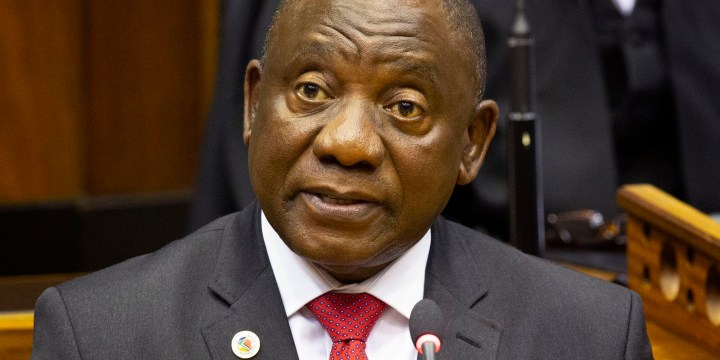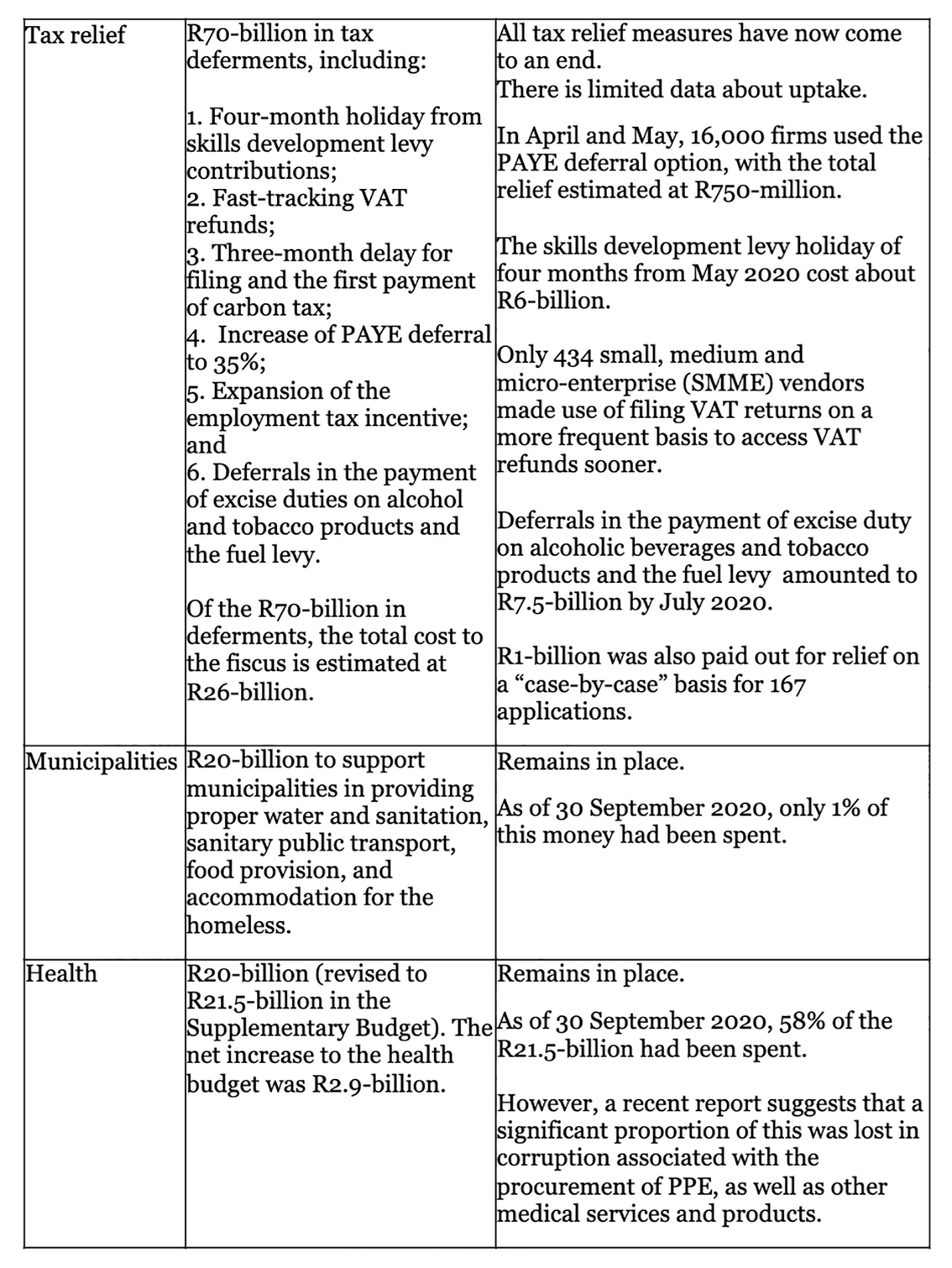OP-ED
Covid-19 package: Relief and rescue are the foundations of economic recovery

When President Cyril Ramaphosa takes to the Sona podium, he is likely to tout the success of the R500bn Covid-19 rescue package – but this success is, sadly, far from the case.
The R500-billion Covid-19 rescue package announced by President Cyril Ramaphosa in April 2020 held hope and promise for many. It came at the start of a period of serious economic devastation.
Based on available data, only around one-third of the rescue package has materialised, and many have suffered as a result. An updated rescue package scorecard by the Institute for Economic Justice (IEJ) shows this slow progress, building on an earlier scorecard published in June 2020.
This inadequate implementation of special Covid-19 rescue measures takes place in the context of approximately two million jobs lost and an unemployment rate of 43% (“expanded definition”). The economy has not bounced back and the majority of these jobs will not return without significant state intervention, although there may have been a partial recovery in certain sectors. Failure to implement the emergency rescue package is also undermining the Covid-19 health response.
The government’s focus has now shifted to strategies for recovery – captured in the president’s Economic Reconstruction and Recovery Plan announced in October 2020. We support the need to ensure economic recovery.
But there can be no recovery without rescue. In the wake of the second wave – in which many businesses have again reduced working hours and sectors such as tourism and retail have taken significant hits – it is self-defeating to pretend further rescue is not needed. The measures initially announced by the president did not take into account the extended lockdowns and associated economic disruptions. While we can plan for economic recovery, we cannot act as if we are out of the woods yet.
We must admit to the failure of the original R500-billion rescue package that never was.
- Instead of R500-billion, the 2020 Supplementary Budget presented a net increase to non-interest spending of just R36-billion, or less than 1% of GDP.
- Only a little over 10% of the two largest components of the rescue package – the R100-billion job protection and creation fund and the R200-billion loan guarantee scheme – has materialised.
The National Treasury’s insistence on opposing spending increases has meant that vital, and affordable, relief measures have been blocked, with devastating consequences for ordinary people, businesses and households.
The IEJ’s updated scorecard – shortly to be released – demonstrates that, in addition to the shrinking size of the package, there has been a systematic failure to implement the rescue measures stipulated. Our estimates show that only about 35% of the package has been utilised to date.



The implementation of the rescue and relief measures has been further undermined by corruption and the mismanagement of resources meant to save the economy.
As of 8 February 2021, the Special Investigating Unit was investigating R10.3-billion in spending on Covid-19 goods and services between April and November 2020, out of a total of R30.7-billion. There are also reports of corruption and management failures in the roll-out of the TERS.
Emergency rescue measures are still needed
The government needs to increase the scale of support, and radically reduce onerous requirements, cumbersome application processes, and stringent eligibility criteria. This will require the National Treasury to abandon its austerity measures. No trade-off can exist between rescue measures and programmes like the vaccine roll-out. Both programmes are vital to avoid further economic fallout and will have positive fiscal multipliers.
Governments around the world are taking dramatic actions to keep their people and economies alive. The South African government must realise that the costs of inaction are high. We reiterate here the recommendations for an improved and expanded rescue package.
Income support
- Incomes for the poorest must be protected. Hunger is on the rise and rates of extreme poverty could more than double. Shift workers, atypically employed workers, informal-sector workers, and the self-employed have been hardest hit.
- Government must extend and increase the Covid-19 SRD grants to, at least, the food poverty line of R585 per person per month. This grant must be provided to caregivers regardless of whether they are receiving a child support grant on behalf of their children.
- Unduly harsh and narrow criteria for accessing the grant need to be abandoned.
- There needs to be urgent progress towards the implementation of the long overdue Basic Income Guarantee (Grant) for those aged 18 to 59 years.
Job creation and protection
- The full R100-billion must be allocated to immediate emergency relief spending, and a plan on its use should be urgently tabled.
- The full Public Employment Stimulus should be implemented, including the social employment programme and a Youth Service.
- The use of the R100-billion must include new industrial policy measures to assist in the targeting of labour-intensive industries.
- Public employment programmes must be expanded, with increased financing in the near term.
Wage support
- The government should extend the TERS scheme with improved administration and reduced delays. The level of compensation should be increased.
- There is an urgent need for investigation into reports of corruption, and payback for those short-changed.
Business support
- Set up a business rescue fund as loans are not always appropriate.
- The following are required for the credit facility:
- Reduce eligibility criteria to improve uptake;
- Outreach strategy to promote access; and
- Rework the terms of the scheme to remove restrictions on use of proceeds and ease terms of repayment.
Tax relief
- SARS and the Treasury should extend tax relief measures for small businesses and employees. These businesses are trying to reopen and cash flow remains a serious constraint.
- Make certain forms of relief automatic for small businesses.
- Develop tax relief measures for households.
- Additional tax revenue must be raised through increasing taxes on the wealthy and high-income earners.
Municipality support
- The rapid scaling up of emergency measures to provide water and sanitation is still required.
- A system of transparency for how money has been spent needs to be designed and implemented.
- A model must be instituted whereby poorer municipalities receive necessary funding as they are the frontlines of service delivery.
- Some municipalities may need bailouts. Financial support mechanisms need to be developed and implemented.
Health funding
- The only way to halt the spread of the virus remains through aggressive testing, tracing, treatment, and isolation/quarantine. These initiatives must remain in place and be increased.
- Further emergency funds are needed to support the public health response, particularly during peaks.
- Vacant posts must be filled and health workers hired to cover sick and overworked staff.
- The government must make available resources, no matter the magnitude, for vaccines. A successful vaccination programme saves multiples of its cost in terms of economic benefits.
- Transparency regarding the vaccine programme funding and logistics must be improved.
- There needs to be continued lobbying for a waiver of intellectual property rights on Covid-19 vaccines and medication.
- Government investment should be channelled into local medical manufacturing capacity.
A failure to rescue the economy will exacerbate the economic scarring that has already occurred as a result of the demand and supply shocks induced by the pandemic. Relief and rescue are the foundations of a recovery. They are by no means once-off events. Without a strong foundation, recovery will be costly, drawn out and painful. We hope that the president will address these concerns in the State of the Nation Address (Sona) later this week. DM
Busi Sibeko, Julia Taylor and Katrina Lehmann-Grube are researchers at the Institute for Economic Justice.
Information pertaining to Covid-19, vaccines, how to control the spread of the virus and potential treatments is ever-changing. Under the South African Disaster Management Act Regulation 11(5)(c), it is prohibited to publish information through any medium with the intention to deceive people on government measures to address Covid-19. We are, therefore, disabling the comment section on this article in order to protect both the commenting member and ourselves from potential liability. Should you have additional information we should know about, please email [email protected]
"Information pertaining to Covid-19, vaccines, how to control the spread of the virus and potential treatments is ever-changing. Under the South African Disaster Management Act Regulation 11(5)(c) it is prohibited to publish information through any medium with the intention to deceive people on government measures to address COVID-19. We are therefore disabling the comment section on this article in order to protect both the commenting member and ourselves from potential liability. Should you have additional information that you think we should know, please email [email protected]"




 Become an Insider
Become an Insider